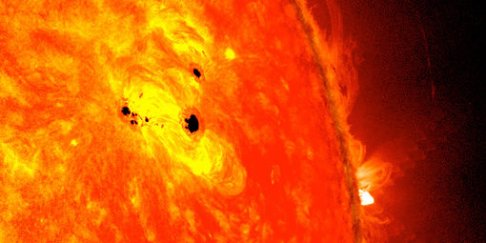A study examining Norwegian population records over two centuries suggests there could be a definitive link between lifespan and high solar activity at the time of an individuals' birth.
People born in years with "high solar activity had a lower probability of surviving to adulthood than those born in years with low solar activity," the researchers wrote in their paper, which was published this week in the journal Proceedings of the Royal Society B.
On average, the lifespans of women and men born in a solar maximum period - when potential exposure to ultraviolet radiation was greatest - were roughly 5.2 years shorter than women and men born in a solar minimum period, they found.
Furthermore, the study suggests that high levels of sun exposure during pregnancy, or at birth, could increase the risk of infant mortality.
Researchers say the explanation for the relationship between solar activity and infant mortality may be an effect of folate degradation during pregnancy caused by ultraviolet radiation.
It is known that low folate levels during pregnancy are linked to higher child mortality rates, the press release states.
The study was led by Gine Roll Skjaervoe, a biologist at the Norwegian University of Science and Technology.
She used demographic data collected from church records to examine two different Norwegian populations. In total, she looked at 9,062 individuals born between 1676 and 1878.
Her objective was to determine whether solar activity at the time of their births was related to the probability of their survival up to the age of 20, and also whether it was related to their fertility and reproductive success across generations.
Solar activity was measured as "the number of sunspots observed on the solar surface".
This varies in an 11-year cycle, with eight years of low solar activity followed by three years of high activity. During periods when sunspots are present, levels of ultraviolet radiation experienced on earth increase significantly.
In terms of the study's contemporary relevance, Skjaervoe said in the press release that pregnant women "should not sunbathe".
Mark Lucock, a nutritional geneticist at the University of Newcastle in Australia, who was not involved in the research, told Live Science the study is "a fascinating piece of work that provides further supporting evidence that early-life environmental factors help shape [human traits] in ways that have long-term consequences."
However, others have been more sceptical.
Dr Helen Mason, a reader in solar Physics at Cambridge University told The Telegraph: "The cycles are only around 11 years so people will be periodically affected by changing levels of UV radiation so it's not just when you are born it's likely to affect your whole lifespan.
"It's true that when the Sun is more active there is more ultraviolet and x-rays but that is not the only effect that is taking place.
"The Earth is bombarded by cosmic rays and when solar activity is high there is evidence that stronger solar winds may protect the Earth."
SOURCE: EurekAlert, The Telegraph
